
Bible Verse and Prayer for Today;
Let not your heart be troubled: ye believe in God, believe also in me.
John 14:1
Prayer
Lord , We believe in You , we Believe in Your Son Jesus , we Believe in the Holy Spirit . Lord in the next few verses your 2nd Coming are confirmed . But we also see your Heart , Lord Jesus . Will there be Faith the day You arrive the 2nd Time . Please help us to Keep this Faith in Jesus name we Pray . Amen and Amen
Prayer Tips
Prayers in the Old Testament
- Daniels Prayer to the Lord
Dan 9:3 And I set my face unto the Lord God, to seek by prayer and
supplications, with fasting, and sackcloth, and ashes:
4 And I prayed unto the LORD my God, and made my confession, and
said, O Lord, the great and dreadful God, keeping the covenant and
mercy to them that love him, and to them that keep his
commandments;
5 We have sinned, and have committed iniquity, and have done wickedly,
and have rebelled, even by departing from thy precepts and from thy
judgments:
6 Neither have we hearkened unto thy servants the prophets, which spoke
in thy name to our kings, our princes, and our fathers, and to all the
people of the land.
7 O Lord, righteousness belongeth unto thee, but unto us confusion of
faces, as at this day; to the men of Judah, and to the inhabitants of
Jerusalem, and unto all Israel, that are near, and that are far off,
through all the countries whither thou hast driven them, because of
their trespass that they have trespassed against thee.
8 O Lord, to us belongeth confusion of face, to our kings, to our princes,
and to our fathers, because we have sinned against thee.
9 To the Lord our God belong mercies and forgivenesses, though we have
rebelled against him;
10 Neither have we obeyed the voice of the LORD our God, to walk in his
laws, which he set before us by his servants the prophets.
11 Yea, all Israel have transgressed thy law, even by departing, that they
might not obey thy voice; therefore the curse is poured upon us, and the
oath that is written in the law of Moses the servant of God, because we
have sinned against him.
12 And he hath confirmed his words, which he spoke against us, and
against our judges that judged us, by bringing upon us a great evil: for
under the whole heaven hath not been done as hath been done upon
Jerusalem.
13 As it is written in the law of Moses, all this evil is come upon us: yet
made we not our prayer before the LORD our God, that we might turn
from our iniquities, and understand thy truth.
14 Therefore hath the LORD watched upon the evil, and brought it upon
us: for the LORD our God is righteous in all his works which he doeth:
for we obeyed not his voice.
15 And now, O Lord our God, that hast brought thy people forth out of the
land of Egypt with a mighty hand, and hast gotten thee renown, as at
this day; we have sinned, we have done wickedly.
16 O Lord, according to all thy righteousness, I beseech thee, let thine
anger and thy fury be turned away from thy city Jerusalem, thy holy
mountain: because for our sins, and for the iniquities of our fathers,
Jerusalem and thy people are become a reproach to all that are about
us.
17 Now therefore, O our God, hear the prayer of thy servant, and his
supplications, and cause thy face to shine upon thy sanctuary that is
desolate, for the Lord’s sake.
18 O my God, incline thine ear, and hear; open thine eyes, and behold our
desolations, and the city which is called by thy name: for we do not
present our supplications before thee for our righteousnesses, but for
thy great mercies.
19 O Lord, hear; O Lord, forgive; O Lord, hearken and do; defer not, for
thine own sake, O my God: for thy city and thy people are called by thy
name.
20 And whiles I was speaking, and praying, and confessing my sin and
the sin of my people Israel, and presenting my supplication before the
LORD my God for the holy mountain of my God;
21 Yea, whiles I was speaking in prayer, even the man Gabriel, whom I
had seen in the vision at the beginning, being caused to fly swiftly,
touched me about the time of the evening oblation.
22 And he informed me, and talked with me, and said, O Daniel, I am now
come forth to give thee skill and understanding.
23 At the beginning of thy supplications the commandment came forth,
and I am come to shew thee; for thou art greatly beloved: therefore
understand the matter, and consider the vision. - Pray in sack and cloth and even fasting is a good prayer tool.
- Humble yourself before God.
Bybel Vers en Gebed vir Vandag
Laat julle hart nie ontsteld word nie; glo in God, glo ook in My.
Johannes 14:1
Gebed
Here, ons glo in U, ons glo in u Seun Jesus, ons glo in die Heilige Gees. Here, in die volgende paar verse word u tweede koms bevestig. Maar ons sien ook u hart, Here Jesus. Sal daar geloof wees die dag dat U die tweede keer aankom? Help ons asseblief om hierdie geloof in Jesus se naam te behou, bid ons. Amen en Amen.
Gebede in die Ou Testament
Daniel se Gebed aan die Here
Dan 9:3 En ek het my aangesig tot die Here God gerig om met vas, en in roukleed en as, my aan gebed en smekinge te wy.
4 En ek het tot die HERE my God gebid en belydenis gedoen en gesê: Ag, Here, grote en gedugte God, wat die verbond en die goedertierenheid hou vir die wat Hom liefhet en sy gebooie onderhou,
5 ons het gesondig en verkeerd gedoen en goddeloos gehandel en in opstand gekom en van u gebooie en verordeninge afgewyk.
6 En ons het nie geluister na u knegte, die profete, wat in u Naam gespreek het tot ons konings, ons owerstes en ons vaders en tot die hele volk van die land nie.
7 Aan U, Here, kom die geregtigheid toe, maar aan ons beskaming van die aangesig soos dit vandag is, aan die manne van Juda en aan die inwoners van Jerusalem en aan die hele Israel, die wat naby en die wat ver is in al die lande waarheen U hulle verdryf het, oor hulle ontrou wat hulle teen U begaan het.
8 Here, aan ons kom toe beskaming van die aangesig, aan ons konings, aan ons owerstes en aan ons vaders, omdat ons teen U gesondig het.
9 By die Here onse God is barmhartigheid en vergewing, want ons het teen Hom opgestaan
10 en na die stem van die HERE onse God nie geluister om te wandel in sy wette wat Hy ons deur die diens van sy knegte, die profete, voorgehou het nie.
11 Maar die hele Israel het u wet oortree en afgewyk deurdat hulle nie na u stem geluister het nie; daarom is die vloek en die eed oor ons uitgestort wat geskrywe is in die wet van Moses, die kneg van God, want ons het teen Hom gesondig.
12 En Hy het sy woorde in vervulling laat gaan wat Hy oor ons gespreek het en oor ons rigters wat ons bestuur het, deur groot onheil oor ons te bring wat onder die ganse hemel nie gebeur het soos in Jerusalem nie;
13 soos in die wet van Moses geskrywe is—al hierdie onheil het oor ons gekom, en ons het die aangesig van die HERE onse God nie om genade gesmeek deur ons te bekeer van ons ongeregtighede en ag te gee op u waarheid nie.
14 Daarom was die HERE wakker oor die onheil, om dit oor ons te bring; want die HERE onse God is regverdig by al sy werke wat Hy doen, maar ons het nie na sy stem geluister nie.
15 Nou dan, o Here onse God wat u volk uit Egipteland met ‘n sterke hand uitgelei en vir U ‘n Naam gemaak het soos dit vandag is, ons het gesondig, ons was goddeloos.
16 o Here, laat tog volgens al u geregtigheid u toorn en u grimmigheid van u stad Jerusalem, u heilige berg, afgewend word, want om ons sondes en die ongeregtighede van ons vaders ontwil is Jerusalem en u volk ‘n voorwerp van versmading vir almal rondom ons.
17 Hoor dan nou, onse God, na die gebed van u kneg en na sy smekinge, en laat ter wille van die Here u aangesig skyn oor u heiligdom wat woes lê.
18 Neig u oor, my God, en hoor, open u oë en aanskou ons verwoeste plekke en die stad waar u Naam oor uitgeroep is; want nie op grond van ons geregtigheid werp ons ons smekinge voor u aangesig neer nie, maar op grond van u grote barmhartigheid.
19 Here, hoor! Here, vergeef! Here, merk op en doen dit, vertoef tog nie, om U ontwil, my God; want u Naam is oor u stad en u volk uitgeroep.
Gabriel Brings an Answer
20 Terwyl ek nog spreek en bid en my sonde en die sonde van my volk Israel bely en my smeking voor die aangesig van die HERE my God neerwerp, ter wille van die heilige berg van my God,
21 terwyl ek nog spreek in die gebed, het die man Gabriël wat ek, uitgeput van vermoeienis, ‘n vorige keer in die gesig gesien het, na my gekom omtrent die tyd van die aandspysoffer.
22 En hy het my onderrig en met my gespreek en gesê: Daniël, nou het ek heengegaan om jou insig te gee.
23 By die begin van jou smekinge het ‘n woord uitgegaan, en ek het gekom om dit mee te deel, want jy is ‘n geliefde man; gee dan ag op die woord en verstaan die gesig.
- Gebed wat in sak en as gebid word en selfs om te vas is ‘n goeie gebedsinstrument.
- Word nederig voor God.

Bible Teaching of the Day
The Lord’s wisdom is failproof
King Solomon was one of the most prolific property developers in biblical history and more than qualified to say, “By wisdom a house is built” (Proverbs 24:3). He constructed the “house of the Lord,” or the temple in Jerusalem on Mount Moriah (2 Chronicles 3:1), a massive project that took seven years and turned out to be one of the wonders of the ancient world. He also built his own magnificent palace—“the House of the Forest of Lebanon” (1 Kings 7:1–3, ESV)—as well as gardens, roads, walls, infrastructure, and many government buildings.
Yet a physical residence was not the only structure Solomon had in mind when he said, “By wisdom a house is built, and through understanding it is established; through knowledge its rooms are filled with rare and beautiful treasures” (Proverbs 24:3–4). Solomon understood that the virtue of wisdom has constructive, life-giving qualities. His maxim closely resembles Proverbs 3:19: “The LORD by wisdom founded the earth; by understanding he established the heavens” (ESV). Wisdom initiates life, produces fruit, and inaugurates creative wonders. Wisdom creates, nurtures, fosters, establishes, and fills a house, whether the “house” is a brick-and-mortar building, a household, a family, an enterprise, a company, an individual reputation, or personal character. In Proverbs 14:1, “The wise woman builds her house, but with her own hands the foolish one tears hers down.”
In Proverbs 24:3 and elsewhere, the Scriptures personify wisdom as a productive, hardworking woman: “Wisdom has built her house; she has carved its seven columns. She has prepared a great banquet, mixed the wines, and set the table” (Proverbs 9:1–2, NLT). Although wisdom is an intangible quality, Solomon describes it poetically, as if it were an actual person. In doing so, Solomon vividly communicates availability of wisdom and the benefits of seeking and finding it.
The “rare and beautiful treasures” that fill the rooms of Proverbs 24:4 could be literal—the wise will handle finances well—but they also symbolize blessings such as harmony, unity, loving family relationships, and a sense of safety, protection, well-being, and stability. “Precious treasure and oil are in a wise man’s dwelling,” says Proverbs 21:20, ESV.
The Bible says that believers are “God’s house.” Through wisdom, we, as God’s children, are built into a solid and secure “house” for the Lord: “But Christ, as the Son, is in charge of God’s entire house. And we are God’s house, if we keep our courage and remain confident in our hope in Christ” (Hebrews 3:6, NLT).
The apostle Paul taught that we are members of the “household of God, built on the foundation of the apostles and prophets, Christ Jesus himself being the cornerstone, in whom the whole structure, being joined together, grows into a holy temple in the Lord. In him you also are being built together into a dwelling place for God by the Spirit” (Ephesians 2:19–22, ESV). As individual members of Christ’s body, we are being built together into one holy temple in the Lord (1 Corinthians 3:17).
The most important stone in any building is the cornerstone. For this reason, Jesus Christ is called the Cornerstone of the church. He is the firm, immovable foundation upon which the entire building is established, undergirded, supported, and constructed. He sets the pattern for the entire structure. Christ is “the power of God and the wisdom of God” upon which we are built (1 Corinthians 1:24).
Peter encouraged believers to come to God through Jesus Christ so they might be built into a spiritual house for God: “As you come to him, the living Stone—rejected by humans but chosen by God and precious to him—you also, like living stones, are being built into a spiritual house to be a holy priesthood, offering spiritual sacrifices acceptable to God through Jesus Christ. . . . But you are a chosen people, a royal priesthood, a holy nation, God’s special possession, that you may declare the praises of him who called you out of darkness into his wonderful light” (1 Peter 2:4–5, 9).
God’s work will last. Without Him, we’re spinning our wheels: “Unless the LORD builds the house, the builders labor in vain” (Psalm 127:1). We must depend on the Lord’s wisdom (see Luke 6:48), but how do we get it? We first receive God’s wisdom when we are filled with His Holy Spirit at salvation (1 Corinthians 2:6–15). After that, James tells us that wisdom is gained by asking God for it (James 1:5). We obtain wisdom by seeking it, pursuing it, and valuing it (Proverbs 2:2, 4–5; 4:8). Likewise, we get wisdom by spending time in God’s Word (Psalm 19:7; Proverbs 4:5–7; 2 Timothy 3:15).
The Lord’s wisdom is failproof. God’s “house” is built by God’s wisdom and God’s power, and Jesus is the Cornerstone. We can trust that it will never crumble or collapse (Matthew 16:18).
Bybel Lering vir die Dag
Die Here se wysheid is onfeilbaar
Koning Salomo was een van die mees produktiewe eiendomsontwikkelaars in die Bybelse geskiedenis en meer as gekwalifiseerd om te sê: “Deur wysheid word ‘n huis gebou” (Spreuke 24:3). Hy het die “huis van die Here”, of die tempel in Jerusalem op die berg Moria (2 Kronieke 3:1), gebou, ‘n massiewe projek wat sewe jaar geneem het en een van die wonders van die antieke wêreld geblyk het te wees. Hy het ook sy eie manjifieke paleis gebou – “die Huis van die Bos van die Libanon” (1 Konings 7:1-3) – sowel as tuine, paaie, mure, infrastruktuur en baie regeringsgeboue.
Tog was ‘n fisiese woning nie die enigste struktuur wat Salomo in gedagte gehad het toe hy gesê het: “Deur wysheid word ‘n huis gebou, en deur verstand word dit bevestig; deur kennis word sy kamers gevul met seldsame en pragtige skatte” (Spreuke 24:3-4). Salomo het verstaan dat die deug van wysheid konstruktiewe, lewegewende eienskappe het. Sy spreuk stem baie ooreen met Spreuke 3:19: “Die HERE het deur wysheid die aarde gegrond; deur verstand het Hy die hemele gevestig” (ESV). Wysheid begin lewe, dra vrugte voort en bring kreatiewe wonders teweeg. Wysheid skep, koester, bevorder, vestig en vul ‘n huis, of die “huis” nou ‘n baksteen-en-sement gebou, ‘n huishouding, ‘n familie, ‘n onderneming, ‘n maatskappy, ‘n individuele reputasie of persoonlike karakter is. In Spreuke 14:1, “Die wyse vrou bou haar huis, maar met haar eie hande breek die dwase haar af.”
In Spreuke 24:3 en elders verpersoonlik die Skrif wysheid as ‘n produktiewe, hardwerkende vrou: “Wysheid het haar huis gebou; sy het sy sewe pilare uitgekap. Sy het ‘n groot feesmaal voorberei, die wyn gemeng en die tafel gedek” (Spreuke 9:1-2, NLT). Alhoewel wysheid ‘n ontasbare eienskap is, beskryf Salomo dit poëties, asof dit ‘n werklike persoon is. Deur dit te doen, kommunikeer Salomo lewendig die beskikbaarheid van wysheid en die voordele daarvan om dit te soek en te vind.
Die “skaars en pragtige skatte” wat die kamers van Spreuke 24:4 vul, kan letterlik wees—die wyse sal finansies goed hanteer—maar hulle simboliseer ook seëninge soos harmonie, eenheid, liefdevolle gesinsverhoudings en ‘n gevoel van veiligheid, beskerming, welstand en stabiliteit. “Kosbare skatte en olie is in die woning van ‘n wyse man,” sê Spreuke 21:20.
Die Bybel sê dat gelowiges “God se huis” is. Deur wysheid word ons, as God se kinders, in ‘n stewige en veilige “huis” vir die Here opgebou: “Maar Christus, as die Seun, is in beheer van God se hele huis. En ons is God se huis, as ons ons moed behou en vertroue in ons hoop op Christus hou” (Hebreërs 3:6).
Die apostel Paulus het geleer dat ons lede is van die “huisgesin van God, gebou op die fondament van die apostels en profete, terwyl Christus Jesus self die hoeksteen is, in wie die hele gebou, goed saamgevoeg, verrys tot ‘n heilige tempel in die Here. In wie julle ook saam opgebou word tot ‘n woning van God deur die Gees” (Efesiërs 2:19–22). As individuele lede van Christus se liggaam word ons saam opgebou tot een heilige tempel in die Here (1 Korintiërs 3:17).
Die belangrikste klip in enige gebou is die hoeksteen. Om hierdie rede word Jesus Christus die Hoeksteen van die kerk genoem. Hy is die vaste, onwankelbare fondament waarop die hele gebou gestig, onderskat, ondersteun en gebou word. Hy stel die patroon vir die hele struktuur. Christus is “die krag van God en die wysheid van God” waarop ons gebou is (1 Korintiërs 1:24).
Petrus het gelowiges aangemoedig om deur Jesus Christus na God te kom sodat hulle in ‘n geestelike huis vir God gebou kan word: “Aangesien julle na Hom toe kom, die lewende Steen wat deur die mense verwerp is, maar deur God uitverkore en vir Hom kosbaar is, word julle ook soos lewende stene opgebou tot ‘n geestelike huis, ‘n heilige priesterdom wat geestelike offers bring wat vir God welgevallig is deur Jesus Christus. … Maar julle is ‘n uitverkore volk, ‘n koninklike priesterdom, ‘n heilige volk, ‘n eiendom, om die deugde te verkondig van Hom wat julle uit die duisternis geroep het tot sy wonderbare lig” (1 Petrus 2:4–5, 9).
God se werk sal voortduur. Sonder Hom draai ons ons wiele: “As die Here die huis nie bou nie, werk die bouers tevergeefs” (Psalm 127:1). Ons moet staatmaak op die Here se wysheid (sien Lukas 6:48), maar hoe kry ons dit? Ons ontvang eers God se wysheid wanneer ons met Sy Heilige Gees gevul word by redding (1 Korintiërs 2:6–15). Daarna vertel Jakobus ons dat wysheid verkry word deur God daarvoor te vra (Jakobus 1:5). Ons verkry wysheid deur dit te soek, na te streef en te waardeer (Spreuke 2:2, 4–5; 4:8). Net so kry ons wysheid deur tyd in God se Woord deur te bring (Psalm 19:7; Spreuke 4:5–7; 2 Timoteus 3:15).
Die Here se wysheid is onfeilbaar. God se “huis” word gebou deur God se wysheid en God se krag, en Jesus is die Hoeksteen. Ons kan vertrou dat dit nooit sal verkrummel of ineenstort nie (Matteus 16:18).

Today’s Devotional
Change my heart Oh God
For a few days, the Lord has been speaking to me, saying, “When God wants to do something great and extensive through you, He will first have to do something deep inside you, which is why He will always work in you first before He works through you.”
While reading this, the lyrics from the song “Change my heart Oh God” by Eddie Espinosa came to mind. It reads,
Change my heart Oh God, make it ever true.
Change my heart Oh God, may I be like You.
You are the potter, I am the clay,
Mold me and make me, this is what I pray.
Change my heart Oh God, make it ever true.
Change my heart Oh God, may I be like You.
Almost every morning I pray, “Lord, I know you are going to do something special today, allow me to be part of it.”
Today, I want to add to this and pray, “Lord, if you want to do something great and extensive through me, first do something deep inside of me. Work in me first before working through me.”
If this is your heart’s desire or your prayer, please pray Psalm 51:10 – 14 with me.
“Create in me a pure heart, O God, and renew a steadfast spirit within me. Do not cast me from your presence or take your Holy Spirit from me. Restore to me the joy of your salvation and grant me a willing spirit, to sustain me. Then I will teach transgressors your ways, so that sinners will turn back to you” – Amen and Amen
Vandag se Bemoediging
Verander my hart O God
Vir ‘n paar dae het die Here met my gepraat en gesê: “Wanneer God iets groots en uitgebreids deur jou wil doen, sal Hy eers iets diep binne-in jou moet doen, daarom sal Hy altyd eers in jou werk voordat Hy deur jou werk.”
Terwyl ek dit gelees het, het die lirieke van die liedjie “Change my heart Oh God” deur Eddie Espinosa by my opgekom. Dit lui:
Verander my hart O God, maak dit altyd waar.
Verander my hart O God, mag ek soos U wees.
U is die pottebakker, ek is die klei,
Vorm my en maak my, dit is wat ek bid.
Verander my hart O God, maak dit altyd waar.
Verander my hart O God, mag ek soos U wees.
Amper elke oggend bid ek: “Here, ek weet U gaan vandag iets spesiaals doen, laat my toe om deel daarvan te wees.”
Vandag wil ek hierby voeg en bid: “Here, as U iets groots en uitgebreids deur my wil doen, doen eers iets diep binne-in my. Werk eers in my voordat U deur my werk.”
As dit jou hart se begeerte of jou gebed is, bid asseblief Psalm 51:10 – 14 saam met my.
“Skep in my ‘n rein hart, o God, en gee opnuut ‘n standvastige gees in die binneste van my. Verwerp my nie van u aangesig nie en neem u Heilige Gees nie van my weg nie. Gee my weer die vreugde van u heil en gee my ‘n gewillige gees om my te ondersteun. Dan sal ek oortreders u weë leer, sodat sondaars hulle tot U kan bekeer” – Amen en Amen

TruLight Ministries Daily Entertainment

TruLight TV – Kingdom Kidz TV – What Does It Mean To Have Patience!
On Today’s Kids Hour Your preschooler will join Olive on Farmer Fred’s farm as she completes chores, sings, plays games, and learns about the fruit of the Spirit. This week, Olive learns what it means to have patience! and later As Luke says goodbye to his friends at Connect HQ, Dot refuses to let him leave and goes to great lengths to get him to stay This and plus some stunning gospel kids’ songs. Enjoy!
INTRODUCTION TO THE GOSPEL ARTISTS
MEET : CANA’S VOICE

Riding the wave of their unprecedented success, Cana’s Voice has combined the multi-genre talents of Jody McBrayer, TaRanda Greene and Doug Anderson to create a unified message of hope for the hurting. Their awe-inspiring harmony, coupled with the beautiful ability to deliver their personal testimonies, has propelled the vocal supergroup into the music industry spotlight.
In addition to each member having well-established solo careers, Cana’s Voice comes together 30 to 40 times a year for special events, as well as exciting concert tours with such artists as acclaimed tenor David Phelps and multi-Grammy winner CeCe Winans. Among their many concerts over the last three years, they have performed at Brooklyn Tabernacle, Bellevue Baptist Church and Shadow Mountain Community Church. They have also been a part of the National Day of Prayer events in Washington, DC, been featured at the Southern Baptist Metro One Worship Conferences and have made regular appearances at Turning Point rallies. Next year, they will be expanding their tour into Norway, Sweden, and Australia.
With countless live appearances behind them and the success of their chart-topping project, This Changes Everything, Cana’s Voice is thrilled about the release of their highly-anticipated sophomore recording project, Don’t Wanna Miss This.Utilizing the skills of today’s most prolific songwriters and working with three award-winning producers, Jim Hammerly, Wayne Haun and Jerard Woods, the group carefully selected songs designed to offer hope to the hopeless. While they want to send the message of God’s love and redeeming grace to as many people as possible, they are particularly concerned for those who are on the edge of giving up on God, Christianity and the church. This project is sure to encourage, inspire and remind listeners to cross life’s mountains with Jesus as their guide.
For Cana’s Voice, this message of hope and perseverance comes from a very personal place. Greene was thrust into the role of single mom and suffered from loneliness and clinical depression following the unexpected death of her first husband, Tony, in 2010. A self-described family man, Anderson and wife Michele are helping his father care for his mother on her journey with Alzheimer’s disease. McBrayer departed multi-award winning CCM group, Avalon, and stepped into a nearly decade-long hiatus from the music industry after being diagnosed with degenerative heart disease. Little did each of them know that lessons learned while walking with God through these valleys would lead to the ministry they have found in Cana’s Voice.
As they minister from personal experiences of navigating through life’s difficulties, Cana’s Voice strives to help audiences understand the importance of pressing on through hard times and believing that God has a greater plan. McBrayer said of the trio, “When we got together to do music, the whole point of this group was to be something unique, genuine and real and to be a part of something done with excellence. We didn’t just want to get in the studio and throw some songs together, but rather, our prayer is that God would give us a platform to change the lives of many people by telling of His grace and mercy.”
The platform they have been given has certainly been a fulfillment of God’s blessing on this group. Building on that foundation, they are looking forward to the future and to bringing their message of hope to a city near you. You Don’t Wanna Miss This!
Today on TruLight Radio XM

TruLight Radio XM 24/7
Program
GMT / UTC +2
00:15 Words to Live By Testimonies
01.15 Science Scripture and Salvation
02.15 Ground Works
04.00 Gospel Concert of the Day
05.00 The Daren Streblow Comedy Show
5:55 It is Today devotional
6:00 Gaither Homecoming Morning Show
7:15 Discover the Word
8.15 Destined for Victory
8:55 Science Scripture and Salvation
9:00 Holy Spirit Hour – Normally Sermons
10:15 Hope of the Heart
11:15 Unshackled
11.45 Words to Live By
12:15 Truth for Life
13:15 Living on the Edge with Chip Ingram
14:15 Focus on the Family
15:00 Kids Hour
16:00 In Touch with Dr. Charles Stanley
16:30 Groundwork
17:15 Live in the Light
18:15 Renewing your Mind
19:00 Gaither Homecoming Show
20:15 Growing Hope
21:15 Adventures in Odyssey Radio Drama
21:45 Bible Reading
22:15 Night-sounds
23.00 Good Old Country Gospel / Rhema Gospel Express
VISIT THE WEBSITE
https://TruLightRadioXM.org.za

Bible Prophecy in the News
The Persian Gulf: Past, Present, and Future
Trump will be remembered as a great leader if, like King Cyrus, he helps the Jews to live peacefully in their land, without fear of being killed by radical Iranian-backed Muslims. Only a true, genuine

The Persian Gulf is a body of water that separates Persia (Iran) from the hub of the Arab world. Indeed, changing the name of the Persian Gulf will be a slap in the face to the Islamic Republic, but one they will use to rally support against the US, with renewed chants of “Death to America,” and perpetuate the suffering of the Iranian people.
It will anger average Iranians, as it is one of the few physical reminders in the world of the name Persia and its rich culture, which they yearn to restore, free from the atrocities of the Islamic Republic, which most Iranians reject. The term ‘Persian’ connects Iranians with their national identity, beginning with King Cyrus, the first king of the Persian Empire, considered the father of the Iranian people, from the sixth century BCE.
Iranians also know that Arabs have tried many times to destroy Persian culture and its heritage, starting in the seventh century when Arabs conquered Persia. Persia was forced into the Islamic world, and Islam was forced on the Persian people. The rise of Islam in Persia and the forced conversion of Persians still feels like a foreign ideology where Islam was not indigenous. Persians – today Iranians – fought to restore their culture and national inheritance throughout history.
The 1979 Islamic Revolution was another invasion of Iran by extremist Muslims like Ayatollah Khomeini and others, whose origin and ideology were not Persian, but Arab. Iran has been occupied and ruled by evil ayatollahs whose intention is to erase Persian history, purging Iranians’ identity and culture, while forcing them to extremist Islam. They initiated a system of hate and brainwashing to build walls around their own brutal, illegitimate rule. There is no religious freedom, and anyone who converts to any other religion would face prison, torture, and even execution.
Further purging Persian culture and history, Iranians are forbidden to visit the tombs of Biblical giants such as King Cyrus, Daniel, Esther, and Mordecai, among other pillars of Persian history.
There’s been an awakening among young Iranians who understand that Islam is the root of their problem, and the ayatollahs are their true enemies; that Islamic extremists have occupied Iran with no respect for Persian culture and history.
King Cyrus is an excellent example to many. He did not bring peace and stability by undermining the history of other nations. Instead, through the power of God, he helped Persians and other great nations like the Jewish people rebuild their history and culture.
God used Cyrus, the first King of the Persian Empire, to return the Jewish people to the Land of their fathers after 70 years of exile, rebuilding the Temple, and restoring their ancient prosperity. Cyrus returned the sacred vessels which Nebuchadnezzar pillaged from Jerusalem, restoring their honor from as far back as Abraham, as recorded in 2 Chronicles 36:22-23.
“In the first year of Cyrus, king of Persia, to fulfill the word of the Lord spoken by Jeremiah, the Lord moved the heart of Cyrus, king of Persia, to make a proclamation throughout his realm and to put it in writing: This is what Cyrus, King of Persia, says. ‘The LORD, the God of heaven, has given me all the kingdoms of the earth, and he has appointed me to build a Temple for him at Jerusalem in Judah. Any of his people among you may go up, and may the LORD their God be with them.’”
King Cyrus is also recognized for his human rights, politics, and military strategy achievements. The Cyrus Cylinder is the world’s first charter of human rights, providing the basis for the first four articles of the Universal Declaration of Human Rights, and translated into all six official languages of the United Nations.
Iranians have compared President Trump to King Cyrus. I have always supported and admired President Trump and his great leadership. I hope he is not deceived by the malicious advice of the Islamic regime’s agents who have infiltrated America. I pray he does not try to build his own legacy by undermining the proud identity of millions of Iranians.
President Trump can truly be the next Cyrus to help Iranians who have suffered under the ayatollahs, to restore their freedom and national honor. We must embolden the people, not erase pillars of their national pride by changing the name of the Persian Gulf. And certainly not by negotiating with the evil Islamic Republic. He should support the only opposition respected among Iranians, Prince Reza Pahlavi, to help Iranians to restore their freedom and honor.
Like Cyrus, President Trump can be remembered as a great leader in the minds and hearts of millions of Christians by standing with God’s chosen people, the Jews, who are fighting against our common enemies, the most barbaric terrorists, whose intention is the extermination of the Israeli people.
Trump will be remembered as a great leader if, like King Cyrus, he helps the Jews to live peacefully in their land, without fear of being killed by radical Iranian-backed Muslims. Only a true, genuine, God-fearing leader is capable of making such great things. May God give our president His wisdom in his policies.
Signs of the Times
Iran is not building a civilian nuclear program

Iran has some of the cheapest electricity prices in the world. The average cost of electricity in the United States per kilowatt hour is $0.181.
In Iran it’s $0.004.
A country where electricity is vastly cheaper than in America isn’t looking to lower power costs.
Iran joins Libya, Kuwait, Iraq, Oman, Qatar and other oil-rich countries as having some of the cheapest electricity prices in the world. Countries with vast energy reserves and production don’t need nuclear energy the way that Germany or France, which depend on imports, do.
Saudi Arabia, with $0.053 electricity, did not begin pursuing a nuclear program because it needed to lower its energy costs. Neither did the UAE. The Saudis and Emiratis became interested in developing a “civilian” nuclear program only as Iran’s nuclear program took off.
If Iran were developing a nuclear program to lower energy costs, it would have long ago dropped the program after sanctions cost its economy an estimated $1 trillion. Losing $1 trillion to shave a few more fractions of a cent off the average cost of a kilowatt makes no sense.
Iran is not interested in peaceful applications of nuclear energy, but in nuclear weapons. That’s why it’s been willing to lose $1 trillion and go to war to protect its nuclear program.
Despite these obvious common sense facts, the Obama administration and some figures in the current administration insist on pretending that a deal can be made to keep Iran’s nuclear program peaceful.
The idea is just as false in 2025 as it was in 2015 when Obama pushed his Iran deal premised on the idea that an Islamic terror state with oil coming out of the ground has lost $1 trillion and gone to the brink of war to lower electricity costs from $0.004 to $0.003.
Consider Iran’s Bushehr nuclear power plant. Under construction since the 90s, its 1,000 megawatts is a drop in the bucket compared to the billions spent on constructing it. (Iran has variously claimed to have spent either $1.7 billion or $4 billion on the plant.)
One of the world’s largest energy producers would not be going to war to add 1,000 megawatts.
Despite Bushehr and the rest of Iran’s extensive and growing nuclear infrastructure, Iran gets only 1% of its electricity from nuclear power. Iran gets most of its actual electricity (86%) from natural gas. And Iran’s natural gas cost is $0.001 per kWh for residential customers (vs $0.081 on average in the world).
With 1.2 trillion cubic feet of natural gas, one of the biggest reserves in the world, Iran has all the energy it needs under its feet. Even without adding the $1 trillion cost of sanctions, the numbers for using nuclear power plants to generate electricity for homes and businesses make no economic sense.
Over 95% of Iranian households depend on gas. And Iran has so much power that it exports electricity to nearby Iraq.
Despite putting on a facade of power and gas shortages to justify its nuclear power program, that’s not because Iran doesn’t have enough gas, but because it prioritizes exports over its domestic market, and uses the revenues for international terrorism.
Iran is the world’s third largest natural gas producer after America and Russia. Where does that money go? It certainly doesn’t go to the Iranian population which gets little to no say in it.
Iran’s trillions of cubic feet of natural gas produced each year also help finance its extremely expensive and devastating nuclear program.
Is Iran planning to spend another $20 billion building nuclear plants (in an economy with a GDP of only $404 billion) because it wants to make sure that its civilian population and businesses have everything that they need?
If Iran really cared about the welfare and prosperity of its civilian population, it would have stopped its nuclear program and ended the international sanctions imposed on it which have hit its consumer goods, and business exports and imports hardest, while doing less to stop its core energy exports and construction businesses that the regime derives much of its wealth from.
Gog and Magog Update
All News Highlights the Past 24 Hours
Trump Tells Syrian President to Join Abraham Accords

Trump Threatens Iran: ‘Choose Right Now,’ Time is Running Out
Trump to Saudi King – By Recognizing Israel, ‘You’ll be Greatly Honoring Me’

Israel will not ‘Commit Suicide’ for Ties with Saudis, Says Israeli Minister
Trump Offers Peace to Iran
Places in the Bible
Temple Mount
Also known as Haram, Haram Ash-Sharif, Haram esh-Sharif, Mount Moriah, the Noble Sanctuary, Temple Platform
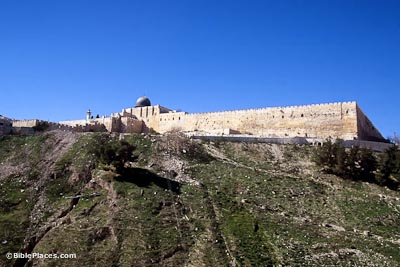
From Kidron Valley
Often visitors wonder why the Temple Mount is not the highest point in the city when the Bible seems to describe it as such. The answer is that the city today (including the “Old City”) has grown and shifted from its original location. The earliest city of Jerusalem is the “City of David,” a smaller hill south of, and lower than, the Temple Mount.
Aerial from East
The present Temple Mount was constructed by Herod the Great beginning in 20 BC. Construction on it continued for 83 years until AD 64 when a halt was called and 18,000 workers were laid off (riots resulted). The Temple Mount is 1/6 the size of today’s Old City and covers 35 acres (14 ha). Construction of this rectangular platform required filling in a large part of the Central Valley.
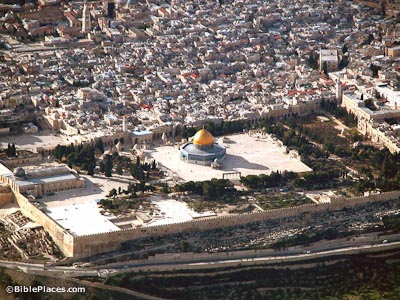
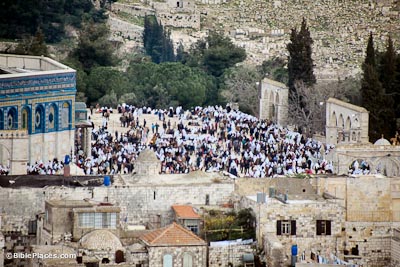
Crowds at Ramadan
Herod enlarged the existing Temple Mount in order to accommodate the larger crowds of Jewish pilgrims coming for the feasts. Today Muslims in Israel celebrate Ramadan by coming to what they call Haram esh-Sharif (the Noble Sanctuary). More than 400,000 Muslims often gather here on the final Friday of the feast. See Dome of the Rock.
Dome of the Tablets
Because of Muslim control of the Temple Mount, archaeologists are prevented from working on the site. Consequently, scholars lack evidence for determining the precise location of the first and second Temples. Asher Kaufman has theorized that the Holy of Holies originally was located not under the Dome of the Rock but under the Dome of the Tablets (aka Dome of the Spirits).
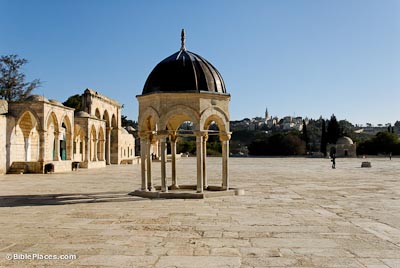
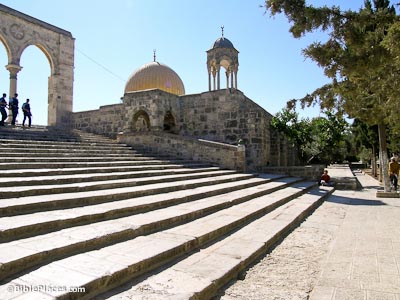
A Telltale Step
Leen Ritmeyer identified a large step at the bottom of one of the staircases which he believes is the top of the west wall of the pre-Herodian Temple Mount. This step is exactly 500 cubits from the eastern wall of the Temple Mount, matching the Mishnaic measurement of the (apparently earlier) Temple Mount. After this interpretation of this step, authorities laid new pavement to cover the wall.
The Seam
On the southeastern side of the Temple Mount is a “seam” of stones where a later addition leans up against the earlier east wall. There is some debate about the date of this earlier wall (the later is clearly Herodian), but Ritmeyer has convincingly demonstrated that the earlier wall forms the corner of the 500 cubit square Temple Mount. If this identification of the earlier Temple Mount is correct, the Temple must have been located where the Dome of the Rock now sits.
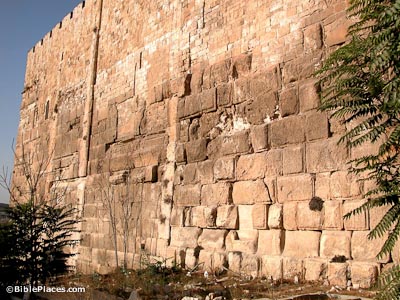
TruLight Ministry News

TruLight Ministries orders from God since 2012 . Teach Them , Comfort Them and Warn Them!
////////////
TruLight Ministries opdrag vanaf God sedert 2012. Leer hulle, Troos hulle en Waarsku hulle!
Pastoor Dirk se Audio Lering 4/8 Laaste 8 Jaar op Aarde – Studie 4 Te Veel Diere word benadeel
TruLight School of Theology have started with Its daily Bible Study – Pastor Counselling Certificate – we are Starting with 36 Studies with 10 Studies per Topic from 1st of April 2025 – Over the Next 2 Years we will Include One Daily Study per Topic on this Platform. The Daily Manna Bible Study will be Available in English and Afrikaans!
We will Start with a 68 week Study on “Know Your Bible” Daily Bible Summaries of every Chapter in the Bible! From the Old Testament to the New Testament , from Genesis to Revelation 66 Books of the Bible.
Started 1st April 2025
This is our Study Principals:
SOAP
Scripture: Read a short passage out loud.
Observation: What do you notice about the verses?.
Application: How can you apply this to your life?.
Prayer: Pray about what you’ve learned.
REAP
Read: Read the passage carefully.
Engage: Ask questions about the passage.
Apply: Think about how the passage applies to your life.
Pray: Pray about what you’ve learned.
Introduction to the Bible – Bible Summary
Summary of the Book of
Zephaniah
Author: Zephaniah 1:1 identifies the author of the Book of Zephaniah as the Prophet
Zephaniah. The name Zephaniah means “defended by God.”
Date of Writing: The book of Zephaniah was written during the reign of King Josiah,
likely in the early part of his reign, between 635 and 625 BC.
Purpose of Writing: Zephaniah’s message of judgment and encouragement contains
three major doctrines: 1) God is sovereign over all nations. 2) The wicked will be
punished and the righteous will be vindicated on the day of judgment. 3) God blesses
those who repent and trust in Him.
Key Verses:
Zephaniah 1:18, “Neither their silver nor their gold will be able to save them on the day
of the LORD’s wrath. In the fire of his jealousy the whole world will be consumed, for he
will make a sudden end of all who live in the earth.”
Zephaniah 2:3, “Seek the LORD, all you humble of the land, you who do what he
commands. Seek righteousness, seek humility; perhaps you will be sheltered on the day
of the LORD’s anger.”
Zephaniah 3:17, “The LORD your God is with you, he is mighty to save. He will take great
delight in you, he will quiet you with his love, he will rejoice over you with singing.”
Brief Summary: Zephaniah pronounces the Lord’s judgment on the whole earth, on
Judah, on the surrounding nations, on Jerusalem, and on all nations. This is followed by
proclamations of the Lord’s blessing on all nations and especially on the faithful
remnant of His people in Judah.
Zephaniah had the courage to speak bluntly because he knew he was proclaiming the
Word of the Lord. His book begins with “The word of the Lord” and ends with “says the
Lord.” He knew that neither the many gods the people worshiped nor even the might of
the Assyrian army could save them. God is gracious and compassionate, but when all His
warnings are ignored, judgment is to be expected. God’s day of judgment is frequently
mentioned in the Scriptures. The prophets called it the “Day of the Lord.” They referred
to various events such as the fall of Jerusalem as manifestations of God’s Day, each of
which pointed toward the ultimate Day of the Lord.
Foreshadowings: The final blessings on Zion pronounced in 3:14-20 are largely
unfulfilled, leading us to conclude that these are messianic prophecies that await
the Second Coming of Christ to be completed. The Lord has taken away our punishment
only through Christ who came to die for the sins of His people (Zephaniah 3:15; John
3:16). But Israel has not yet recognized her true Savior. This is yet to happen (Romans
11:25-27).
The promise of peace and safety for Israel, a time when their King is in their midst, will
be fulfilled when Christ returns to judge the world and redeem it for Himself. Just as He
ascended to heaven after His resurrection, so will He return and set up a new Jerusalem
on earth (Revelation 21). At that time, all God’s promises to Israel will be fulfilled.
Practical Application: With a few adjustments in names and situations, this prophet of
7th century B.C. could stand in our pulpits today and deliver the same message of
judgment of the wicked and hope for the faithful. Zephaniah reminds us that God is
offended by the moral and religious sins of His people. God’s people will not escape
punishment when they sin willfully. Punishment may be painful, but its purpose may be
redemptive rather than punitive. The inevitability of the punishment of wickedness gives
comfort in a time when it seems that evil is unbridled and victorious. We have the
freedom to disobey God but not the freedom to escape the consequences of that
disobedience. Those who are faithful to God may be relatively few, but He does not
forget them.
Inleiding tot die Bybel – Bybel Samevatting
Opsomming van die boek
Sefanja
Skrywer: Sefanja 1:1 identifiseer die skrywer van die Boek Sefanja as die profeet Sefanja.
Die naam Sefanja beteken “deur God verdedig.”
Skrywedatum: Die boek Sefanja is geskryf tydens die bewind van koning Josia,
waarskynlik in die vroeë deel van sy bewind, tussen 635 en 625 vC.
Doel van skryf: Sefanja se boodskap van oordeel en bemoediging bevat drie
hoofleerstellings: 1) God is soewerein oor alle nasies. 2) Die goddelose sal gestraf word
en die regverdiges sal geregverdig word op die dag van oordeel. 3) God seën diegene
wat hulle bekeer en op Hom vertrou.
Sleutelverse:
Sefanja 1:18 , “Nie hulle silwer of hulle goud sal hulle kan red op die dag van die toorn
van die HERE nie. In die vuur van sy ywer sal die hele wêreld verteer word, want Hy sal ‘n
skielike einde maak aan almal wat op die aarde woon.”
Sefanja 2:3 , “Soek die HERE, alle nederiges van die land, julle wat doen wat Hy beveel.
Soek geregtigheid, soek ootmoed; miskien sal julle beskut wees op die dag van die
toorn van die HERE.”
Sefanja 3:17 , “Die HERE jou God is met jou, Hy is magtig om te red. Hy sal ‘n groot
welbehae in jou hê, Hy sal jou stil maak met sy liefde, Hy sal oor jou juig met gejubel.”
Kort opsomming: Sefanja spreek die Here se oordeel uit oor die hele aarde, oor Juda,
oor die omliggende nasies, oor Jerusalem en oor al die nasies. Dit word gevolg deur
verkondigings van die Here se seën op alle nasies en veral op die getroue oorblyfsel van
sy volk in Juda.
Sefanja het die moed gehad om reguit te praat omdat hy geweet het dat hy die Woord
van die Here verkondig. Sy boek begin met “Die woord van die Here” en eindig met “sê
die Here.” Hy het geweet dat nie die baie gode wat die mense aanbid het of selfs die
mag van die Assiriese leër hulle kon red nie. God is genadig en deernisvol, maar
wanneer al Sy waarskuwings geïgnoreer word, is oordeel te wagte. God se oordeelsdag
word gereeld in die Skrif genoem. Die profete het dit die “Dag van die Here” genoem.
Hulle het na verskeie gebeurtenisse soos die val van Jerusalem verwys as manifestasies
van God se Dag, wat elkeen na die uiteindelike Dag van die Here gewys het.
Voorafskaduwings: Die finale seëninge oor Sion wat in 3:14-20 uitgespreek word, is
grootliks onvervuld, wat daartoe lei dat ons tot die gevolgtrekking kom dat dit
messiaanse profesieë is wat wag op die wederkoms van Christus om voltooi te word. Die
Here het ons straf net weggeneem deur Christus wat gekom het om vir die sondes van
sy volk te sterf ( Sefanja 3:15 ; Joh 3:16 ). Maar Israel het nog nie haar ware Verlosser
erken nie. Dit moet nog gebeur ( Romeine 11:25-27 ).
Die belofte van vrede en veiligheid vir Israel, ‘n tyd wanneer hulle Koning in hulle midde
is, sal vervul word wanneer Christus terugkeer om die wêreld te oordeel en dit vir
Homself te verlos. Net soos Hy na sy opstanding na die hemel opgevaar het, so sal Hy
terugkeer en ‘n nuwe Jerusalem op aarde oprig ( Openbaring 21 ). Op daardie tydstip sal
al God se beloftes aan Israel vervul word.
Praktiese Toepassing: Met ‘n paar aanpassings in name en situasies kon hierdie profeet
van 7de eeu vC vandag op ons kansels staan en dieselfde boodskap van oordeel oor die
goddelose en hoop vir die gelowiges lewer. Sefanja herinner ons daaraan dat God
aanstoot neem deur die morele en godsdienstige sondes van Sy volk. God se volk sal
nie straf vryspring wanneer hulle opsetlik sondig nie. Straf kan pynlik wees, maar die
doel daarvan kan eerder verlossend as straf wees. Die onvermydelikheid van die straf
van goddeloosheid gee vertroosting in ‘n tyd wanneer dit lyk asof die bose
ongebreideld en oorwinnend is. Ons het die vryheid om aan God ongehoorsaam te
wees, maar nie die vryheid om die gevolge van daardie ongehoorsaamheid te ontsnap
nie. Diegene wat aan God getrou is, is dalk betreklik min, maar Hy vergeet hulle nie.
We are Currently reading and Listening to the Bible, a Chapter a Day !
The total number of chapters in the Bible is 1,189. There are 929 chapters within 39 books of the Old Testament and 260 chapters within the 27 books of the New Testament.
Genesis 32 / 33 English – Follow the Reading in Your Bible.
Genesis 32 / 33 Afrikaans – Volg die Leser in u Bybel.
Share this Feeding of Manna with your Friends and Family. just click on the Social Media icon and share !